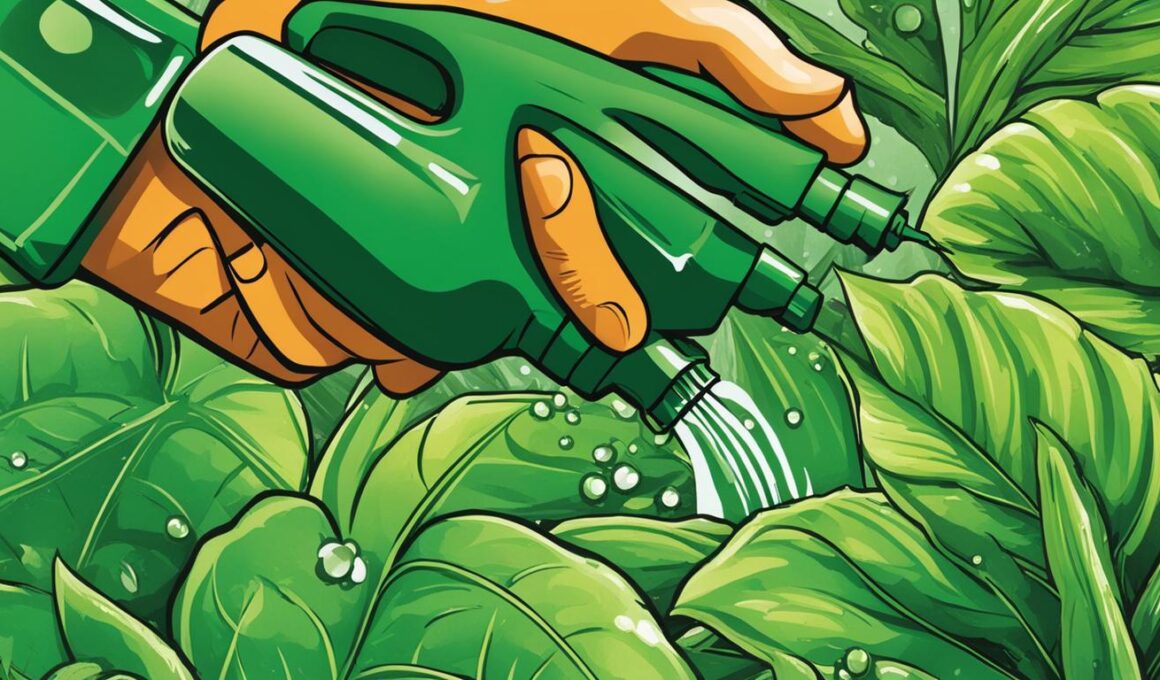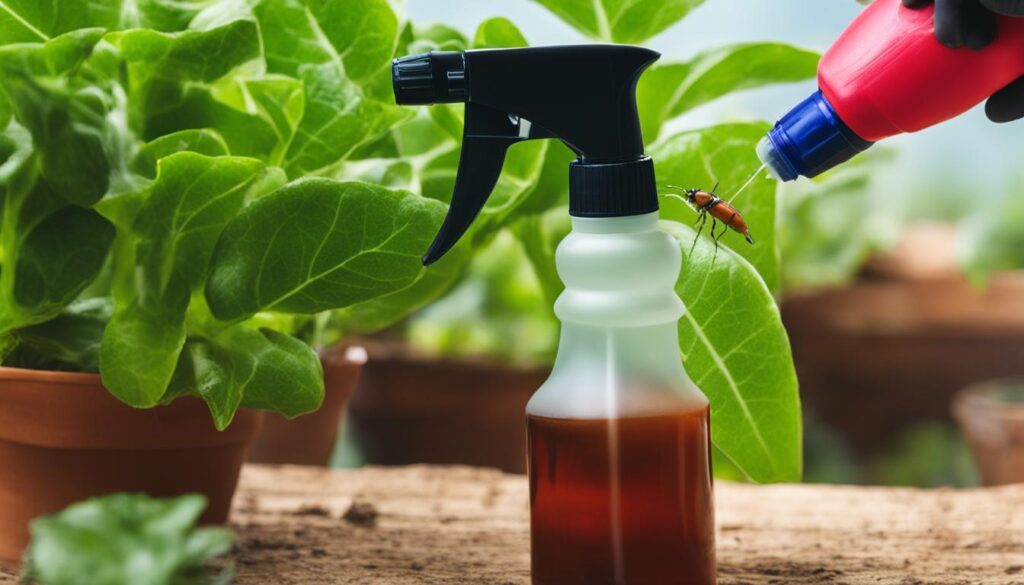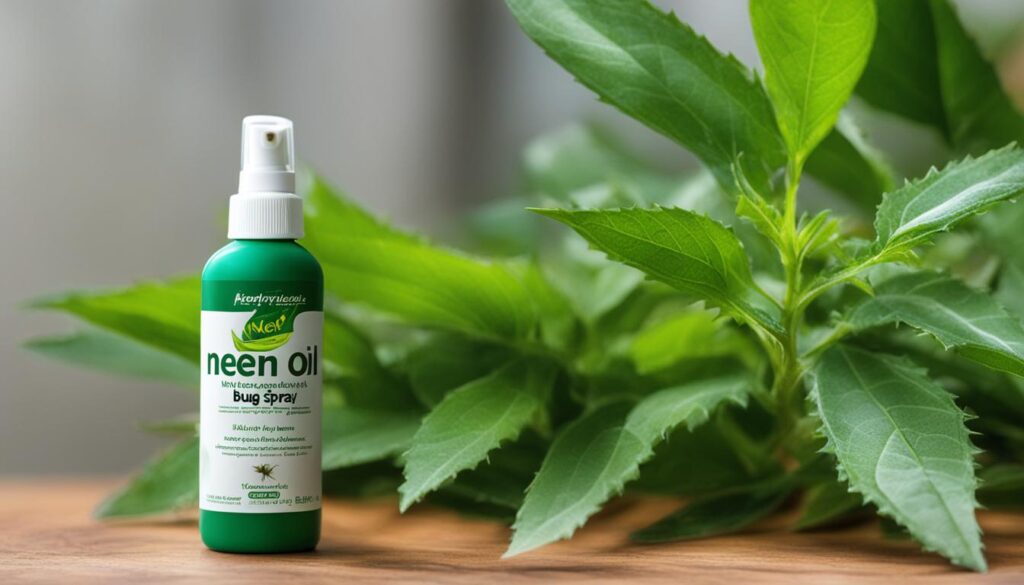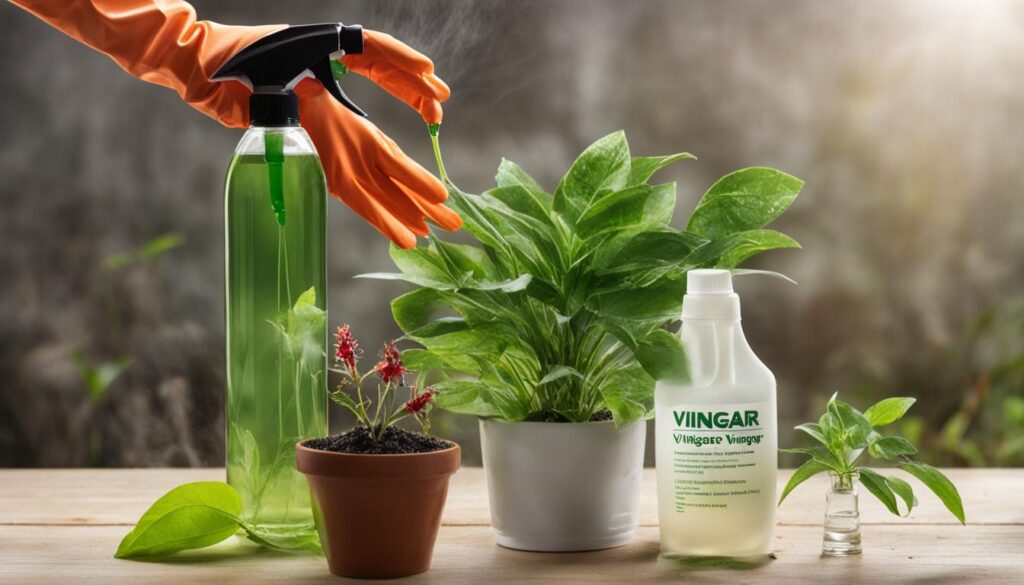Spraying plants with the right insecticide can be an effective way to eliminate bugs that harm your garden. There are several types of sprays available, including homemade options that use natural ingredients. By choosing the right spray, you can protect your plants and promote a healthy garden environment. Here are some effective spray options for killing bugs and preventing damage to your plants.
Key Takeaways:
- Choosing the right bug spray is crucial for protecting your garden from harmful bugs.
- Homemade insecticidal soap, neem oil bug spray, vinegar spray, garlic spray, tomato leaf spray, and cinnamon spray are all effective options.
- Test any spray on a small portion of the plant before applying it to the entire plant.
- Promote a healthy garden ecosystem with plant diversity and attracting beneficial insects to reduce the need for bug sprays.
- By using these effective bug sprays, you can protect your plants and ensure a thriving garden.
Homemade Insecticidal Soap
One effective bug spray for a variety of pests is homemade insecticidal soap. It’s easy to make with simple ingredients you probably already have in your pantry. To create the spray, combine one cup of vegetable oil with one tablespoon of dishwashing soap or pure Castile liquid soap. This mixture will be the concentrate.
To use the insecticidal soap, dilute one teaspoon of the concentrate with two cups of warm water in a spray bottle. Shake it well to ensure it’s thoroughly mixed. This homemade spray is particularly effective against aphids, lacebugs, leafhoppers, mealybugs, and thrips, making it a versatile solution for your garden pest problems.
Homemade insecticidal soap is a safe and environmentally friendly option for controlling pests on your plants. It works by suffocating the insects and disrupting their cell membranes. This method is less harmful to beneficial insects and pollinators, making it a great choice for maintaining a healthy garden ecosystem.
Tip: It’s always a good idea to test any spray on a small portion of the plant before applying it to the entire plant. This will help ensure that the spray does not have any adverse effects on your plants.
Neem Oil Bug Spray
When it comes to combating pests in your garden, neem oil bug spray is an organic insecticide that should be on your radar. This natural solution has been used for centuries in India and has gained popularity worldwide for its effectiveness against a wide range of pests. One of the key benefits of neem oil is its ability to target pests like mites, whitefly, aphids, thrips, and mealybugs, making it a versatile option for pest control.
Aside from its ability to eliminate garden pests, neem oil bug spray also provides protection against fungal diseases such as powdery mildew. This is particularly useful for maintaining the overall health and well-being of your plants. By applying a neem oil spray, you can create a safe and organic barrier that deters pests and prevents damage.
To make your own neem oil bug spray, simply mix one to two tablespoons of pure, cold-pressed neem oil with a gallon of water. Adding one to two teaspoons of dish soap helps the oil adhere to the plants. Be sure to apply the spray to both the tops and undersides of the leaves, as pests tend to hide in these areas. The best part is that neem oil is safe for birds, pets, and beneficial insects, as it gets absorbed into the plant’s tissue rather than just sitting on the surface.
Key Points:
- Neem oil bug spray is an effective organic insecticide for garden pests.
- It targets pests like mites, whitefly, aphids, thrips, and mealybugs.
- Neem oil also protects against fungal diseases such as powdery mildew.
- To make neem oil bug spray, mix neem oil with water and add a small amount of dish soap.
- Apply the spray to the tops and undersides of the leaves for optimal effectiveness.
- Neem oil is safe for birds, pets, and beneficial insects.
Vinegar Spray
If you’re looking for a natural and effective way to repel ants and treat a wide range of garden pests, vinegar spray is a great option. Vinegar, specifically the acetic acid it contains, has insecticidal properties that make it an excellent bug spray for plants. To create a vinegar spray, simply mix one cup of white vinegar with three cups of water in a spray bottle. Adding half a teaspoon of dishwashing soap helps the solution adhere to the plants and increase its effectiveness.
When using vinegar spray, be sure to spray under the leaves as well, as this is where pests like whitefly eggs often hide. The acetic acid in the vinegar helps repel ants and other garden pests, making it a versatile spray for your plants. Keep in mind that vinegar can also alter the pH of the soil, so it’s best to use this spray sparingly and only when necessary.
Garlic Spray
When it comes to repelling pests in your garden, garlic spray is a powerful and natural solution. The pungent odor of garlic is incredibly effective in keeping aphids, slugs, and carrot fly away from your plants. To make garlic spray, start by pureeing two garlic bulbs with one tablespoon of vegetable oil. Let the mixture sit overnight for maximum potency. Then, strain the mixture and add one teaspoon of mild liquid soap and four cups of water. Store the solution in the fridge until needed.
To apply the garlic spray, make sure to spray both sides of the leaves in the evening, as this is when pests are most active. Reapply every few days during infestations to ensure continuous protection. Remember to test the spray on a small portion of the plant before applying it to the entire plant to avoid any potential negative effects.
Garlic spray not only repels pests effectively but also provides a natural and eco-friendly alternative to chemical insecticides. By using garlic spray, you can protect your plants from damage and maintain a healthy garden without harmful chemicals. It is a simple and cost-effective solution that can make a significant difference in the overall health and productivity of your garden.
Tomato Leaf Spray
Tomato leaf spray is a natural and effective solution for treating pests that can harm your plants. The leaves of tomatoes contain a compound called alkaloid, which is toxic to pests like aphids and mites. By harnessing the power of this natural compound, you can treat pests and prevent damage to your garden.
To make tomato leaf spray, simply mix equal quantities of chopped tomato leaves with water. Let the mixture steep overnight, allowing the alkaloid to infuse into the water. The next day, strain the mixture and transfer it into a spray bottle. Now, you’re ready to apply the tomato leaf spray to your plants.
Spray the solution onto the leaves of your plants, making sure to cover both the tops and undersides. This ensures that the spray reaches any pests hiding on the foliage. The alkaloid in the tomato leaf spray will work to eliminate aphids, mites, and other harmful insects, protecting your plants from damage.
Using tomato leaf spray is a natural and eco-friendly way to combat pests in your garden. Instead of relying on harsh chemicals, you can harness the power of nature to keep your plants healthy and thriving. Give tomato leaf spray a try and see the difference it can make in preventing pest damage.
Cinnamon Spray
Cinnamon spray is a natural and effective solution to repel pests and create an effective barrier around your plants. This simple homemade spray can help keep away stray mushrooms, ants, and other unwanted insects, ensuring the health and well-being of your garden. It’s easy to make and use, making it a convenient option for plant lovers.
To create cinnamon spray, mix two teaspoons of cinnamon powder with four cups of warm water. Allow the mixture to steep overnight, then strain it into a spray bottle. Now, you have your homemade cinnamon spray ready to use!
Gently mist the potting soil and the plants with the cinnamon spray, paying special attention to the areas where you want to repel pests. The strong aroma of cinnamon acts as a natural deterrent, keeping bugs at bay and preventing them from damaging your plants. Plus, it’s a safe and non-toxic method that won’t harm the environment or pose a risk to beneficial insects.
Benefits of Cinnamon Spray:
- Cinnamon spray acts as an effective barrier, deterring pests from entering your garden.
- It repels ants and keeps stray mushrooms from growing near your plants.
- The natural properties of cinnamon provide a safe and non-toxic alternative to chemical insecticides.
- Misting your plants with cinnamon spray can help maintain a healthy and pest-free garden environment.
By incorporating cinnamon spray into your plant care routine, you can protect your beloved plants from unwanted pests and create a thriving garden that showcases their beauty.
Conclusion
Choosing the right spray for plants is crucial to protect your garden from harmful bugs. There are several effective bug sprays available that can help you in this endeavor. Homemade insecticidal soap, neem oil bug spray, vinegar spray, garlic spray, tomato leaf spray, and cinnamon spray are all natural insecticides that can effectively kill bugs and prevent damage to your plants.
Before applying any spray to your plants, it’s important to test it on a small portion of the plant to ensure compatibility. This will help you avoid any potential harm to your precious garden. Additionally, promoting a healthy garden ecosystem by incorporating plant diversity and attracting beneficial insects can significantly reduce the need for bug sprays.
By using these effective bug sprays and adopting sustainable gardening practices, you can protect your garden and ensure its thriving growth. Remember, protecting your plants from bugs is an important step in maintaining a beautiful and healthy garden.
Can the Effective Plant Spray also be used to Get Rid of White Fly on Plants Naturally?
Yes, an effective plant spray can be used to get rid of white fly on plants naturally. To learn how to get rid of white fly without using harsh chemicals, consider using a neem oil spray, which is a natural insecticide that can effectively control and eliminate white fly infestations.
FAQ
How do I make homemade insecticidal soap?
To make homemade insecticidal soap, combine one cup of vegetable oil with one tablespoon of dishwashing soap or pure Castile liquid soap. Dilute one teaspoon of the concentrate with two cups of warm water in a spray bottle. This spray is effective against aphids, lacebugs, leafhoppers, mealybugs, and thrips.
How do I make neem oil bug spray?
To make neem oil bug spray, mix one to two tablespoons of pure, cold-pressed neem oil with a gallon of water. Add one to two teaspoons of dish soap to help the oil adhere to the plants. Apply the spray to the tops and undersides of the leaves. Neem oil is safe for birds, pets, and beneficial insects.
How do I make vinegar spray for plants?
To make vinegar spray, mix one cup of white vinegar with three cups of water. Adding half a teaspoon of dishwashing soap helps the solution adhere to the plants. Spray under the leaves for pests like whitefly eggs. Vinegar is effective against a wide range of pests and can repel ants.
How do I make garlic spray for my garden?
To make garlic spray, puree two garlic bulbs with one tablespoon of vegetable oil and let it sit overnight. Strain the mixture and add one teaspoon of mild liquid soap and four cups of water. Spray both sides of the leaves with the garlic spray in the evening and reapply every few days. Garlic spray is effective against aphids, slugs, and carrot fly.
How do I make tomato leaf spray?
To make tomato leaf spray, mix equal quantities of chopped tomato leaves with water. Let the mixture steep overnight, then strain it into a spray bottle. Apply the spray to the plant’s leaves. Tomato leaf spray can help prevent damage from pests like aphids and mites.
How do I make cinnamon spray for plants?
To make cinnamon spray, mix two teaspoons of cinnamon powder with four cups of warm water. Let the mixture steep overnight, then strain it and pour it into a spray bottle. Mist the potting soil and plants with the cinnamon spray. Cinnamon can repel pests like stray mushrooms and ants.
What are some effective bug sprays for plants?
Some effective bug sprays for plants include homemade insecticidal soap, neem oil bug spray, vinegar spray, garlic spray, tomato leaf spray, and cinnamon spray. These sprays can help kill bugs and prevent damage to your garden.
How can I protect my garden from harmful bugs?
Choosing the right spray for plants, like homemade insecticidal soap or neem oil bug spray, can be crucial in protecting your garden. Additionally, promoting a healthy garden ecosystem with plant diversity and attracting beneficial insects can reduce the need for bug sprays.












